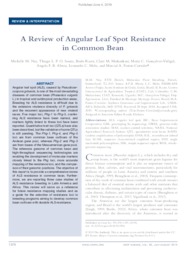A review of angular leaf spot resistance in common bean.
A review of angular leaf spot resistance in common bean.
Author(s): NAY, M. M.; SOUZA, T. L. P. O.; RAATZ, B.; MUKANKUSI, C. M.; GONÇALVES-VIDIGAL, M. C.; ABREU, A. F. B.; MELO, L. C.; PASTOR-CORRALES, M. A.
Summary: Angular leaf spot (ALS), caused by Pseudocer-cospora griseola, is one of the most devastating diseases of common bean (Phaseolus vulgarisL.) in tropical and subtropical production areas. Breeding for ALS resistance is difficult due to the extensive virulence diversity of P. griseolaand the recurrent appearance of new virulent races. Five major loci, Phg-1 to Phg-5, confer-ring ALS resistance have been named, and markers tightly linked to these loci have been reported. Quantitative trait loci (QTLs) have also been described, but the validation of some QTLs is still pending. The Phg-1, Phg-4, and Phg-5loci are from common bean cultivars of the Andean gene pool, whereas Phg-2 and Phg-3are from beans of the Mesoamerican gene pool. The reference genome of common bean and high-throughput sequencing technologies are enabling the development of molecular markers closely linked to the Phg loci, more accurate mapping of the resistance loci, and the compar-ison of their genomic positions. The objective of this report is to provide a comprehensive review of ALS resistance in common bean. Further-more, we are reporting three case studies of ALS resistance breeding in Latin America and Africa. This review will serve as a reference for future resistance mapping studies and as a guide for the selection of resistance loci in breeding programs aiming to develop common bean cultivars with durable ALS resistance.
Publication year: 2019
Types of publication: Journal article
Unit: Embrapa Rice & Beans
Observation
Some of Embrapa's publications are published as ePub files. To read them, use or download one of the following free software options to your computer or mobile device. Android: Google Play Books; IOS: iBooks; Windows and Linux: Calibre.
Access other publications
Access the Agricultural Research Database (BDPA) to consult Embrapa's full library collection and records.
Visit Embrapa Bookstore to purchase books and other publications sold by Embrapa.

